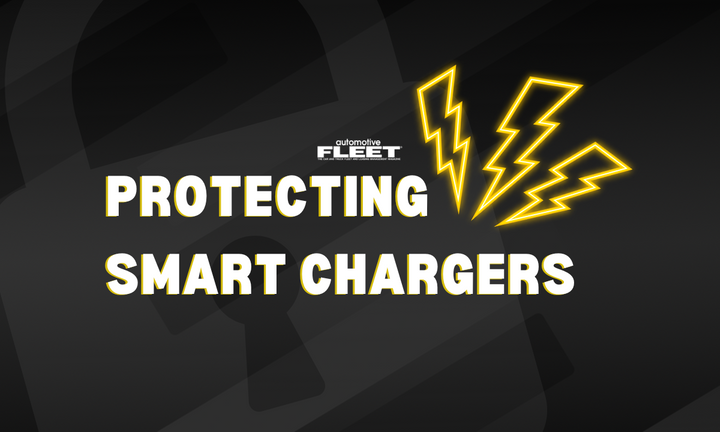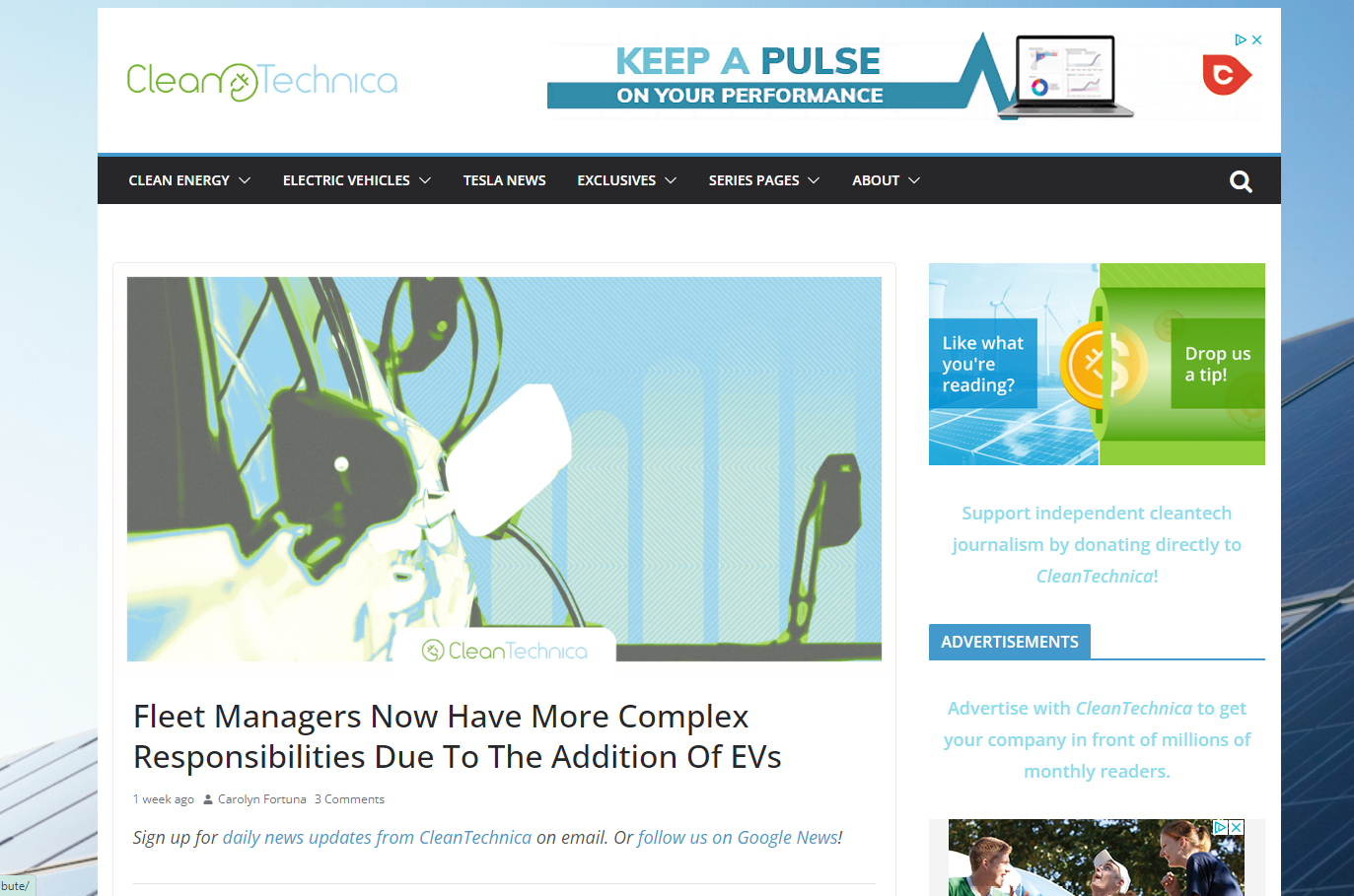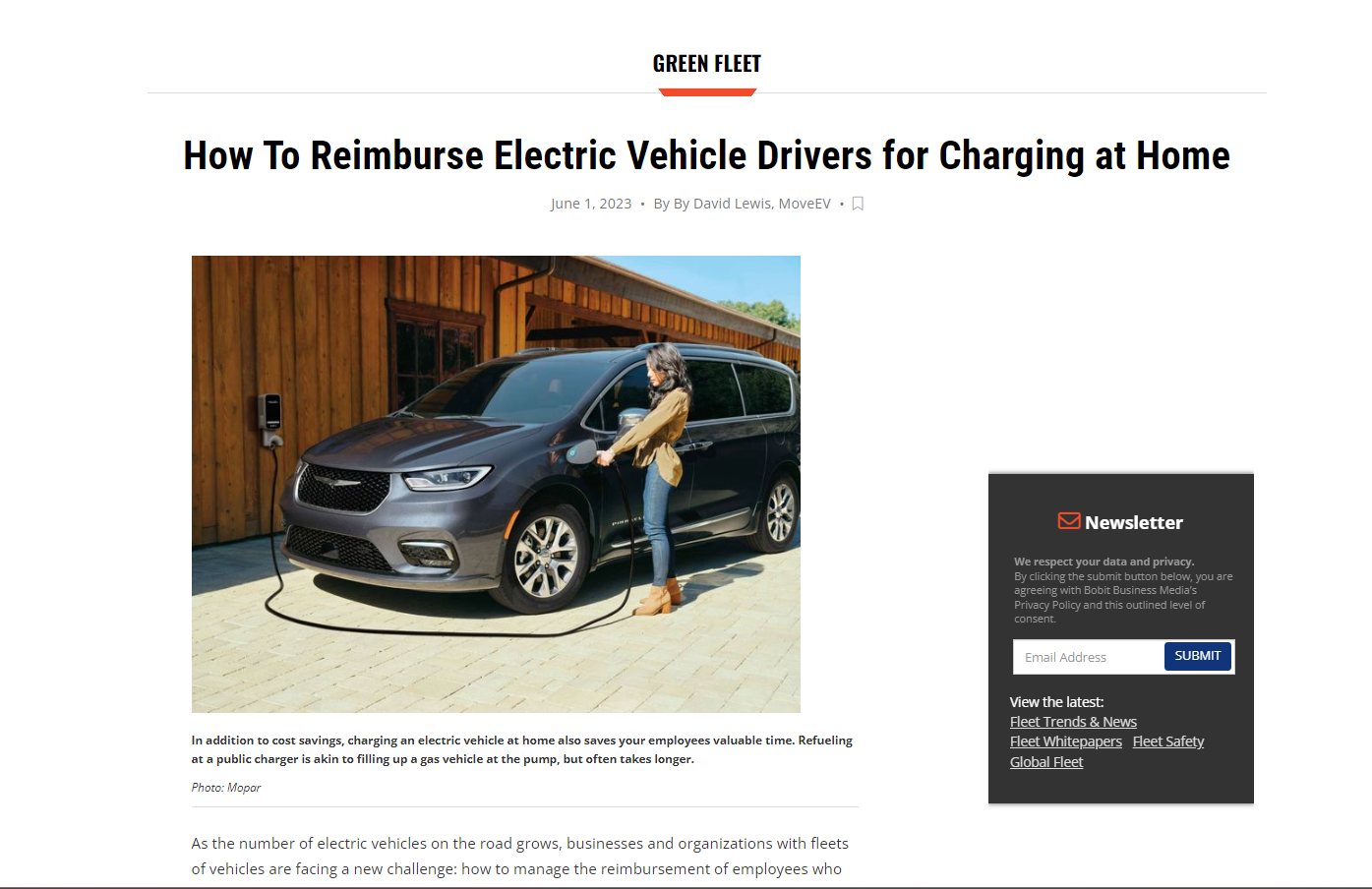
Why MoveEV’s Direct Pay Feature Matters So Much: Insights from CBRE’s Amy Allen at Geotab Connect
Eliminate out-of-pocket costs and streamline home charging reimbursement with MoveEV’s Direct Pay feature. During Geotab Connect 2025, CBRE’s Amy Allen shared how this innovative solution is helping fleets overcome one of the biggest challenges in EV adoption—ensuring accurate, timely, and tax-free reimbursements for drivers.
🔎 Learn how MoveEV’s Direct Pay puts money back into employees’ pockets faster and simplifies fleet electrification.

Networked “Smart” Chargers Pose a Bigger Security Risk Than Companies Realize
In the Automotive Fleet article, experts raise alarms about the hidden cybersecurity risks that networked smart EV chargers present to companies. As fleet electrification grows, businesses increasingly rely on these smart chargers, but many overlook the serious security vulnerabilities embedded in their connected systems. Hackers could potentially use these chargers as entry points to access corporate networks, siphon off sensitive data, or even disable critical infrastructure. The article emphasizes that failing to secure these devices could lead to significant operational disruptions or financial loss.

Fleet Managers Now Have More Complex Responsibilities Due To The Addition Of EVs
MoveEV’s founder, David Lewis examines the shifting responsibilities of fleet managers with the rise of electric vehicles (EVs). He explains the benefits of installing home chargers for employees, which can streamline operations and reduce costs. Lewis notes that low-mileage drivers can use Level 1 chargers, while high-mileage drivers benefit from non-networked Level 2 chargers, avoiding the costs and liabilities of networked options. Careful planning is crucial for cost-effective and flexible solutions tailored to fleet needs. Read more if you want to understand how to optimize your company's EV charging strategy.

5 Ways Residential Charging Enhances the Environmental Benefits of EVs
Delve into the realm of electric vehicles (EVs) home charging and the environmental impact this practice can have this Earth Month with Kate Harrison's illuminating analysis on Energy Capital HTX. This article highlights the pivotal role of residential charging in enhancing the eco-friendly advantages of EVs. Home charging reduces emissions and optimizes energy efficiency, showcasing how EV owners significantly contribute to a cleaner environment while advancing towards renewable energy sources. Explore the full article on Energy Capital HTX to gain a deeper understanding of how residential charging is revolutionizing the environmental landscape of electric vehicles.

Fleet Manager's Guide: Common and Costly Home Charging Calculation Errors
Fleet managers are increasingly turning to home charging solutions to power their electric vehicle (EV) fleets. However, navigating the complexities of home charging reimbursement requires a keen understanding of common calculation errors that can easily and unintentionally distort driver payments. Over-paying drivers is inefficient and can have tax implications. Under-paying can reduce driver home charging behavior and open a company up to liability. This article provides a detailed overview on key pitfalls that fleet managers must avoid to ensure accurate calculations and highlights the benefit of using a software base solution to avoid costly errors.

A Guide For Fleet Managers Considering At-Home Charging
The transition to electric is on the rise, challenging fleet managers to adapt. While at-home charging offers time and cost savings, accessibility can be an issue. Not all drivers have the luxury to plug in or have the infrastructure to install a level 2 charger at home. The process of transitioning really depends on the employee. This article covers the top factors that fleet managers should understand and consider when approaching this transition. Read more insights valuable to fleet managers on the EV Universe site.

Empowering Municipalities: A Charge-at-Home First Approach for EV Fleets
Explore the latest insights from Government Fleet, a national transportation trade outlet catering to fleet managers in the public sector, as they delve into the "Charge at Home First" approach for municipal electric vehicle (EV) fleets. This article from David Lewis of MoveEV sheds light on the strategic shift towards home charging solutions, emphasizing efficiency and sustainability in municipal fleet operations. Key points include the benefits of home charging infrastructure on costs savings, leveraging off-peak utility rates, and the practical time saving benefits of having a workforce start the day with a “full tank.”

MoveEV Offers Home Charging Savings Calculator for Fleet Managers
The MoveEV Home Charging Savings Calculator is designed specifically for fleet managers. This tool empowers fleet operators to accurately estimate the potential cost savings associated with implementing home charging solutions for their electric fleet vehicles.

Are Hybrids The Fool’s Gold of Electrification?
Check out our recent article in Fleet Management Weekly on plug-in hybrid vehicles. MoveEV Co-Founder and Head of Marketing, Kate L. Harrison, dissects the complexities of hybrid vehicles for take-home fleet. The article highlights the environmental and financial benefits of plug-in hybrid electric vehicles (PHEVs), emphasizing that regular charging is crucial for these advantages to materialize—saving approximately 1.5 tons of carbon annually and offering significant fuel cost savings. Harrison also explores what happens financially and environmentally when companies do not implement the proper policies for home charging PHEVs.

Electrifying Your Fleet: 5 Reasons to Consider a Charging at Home Program
“Electrifying Your Fleet: A Roadmap to EV Home Charging Policies" offers valuable insights into the transition to electric vehicles (EVs) for fleet managers. The article discusses the importance of implementing effective EV home charging policies to support the widespread adoption of electric vehicles in fleet operations.
This informative article serves as a comprehensive guide for fleet managers looking to embrace electric mobility, with MoveEV standing out as a trusted partner in the journey towards a sustainable future. Explore the full article to discover how MoveEV can empower your fleet with reliable EV charging solutions.

Top Technology Trends in Fleet Electrification for 2024
This article looks at the top five changes happening in fleet electrification in 2024. First, there's smart charging for electric vehicles (EVs). Then, telematics and fleet management systems are making managing EVs easier. New battery tech and vehicle-to-grid (V2G) technology are also shaking things up, saving money and making the grid more stable. Overall, these changes are making transportation greener and more efficient. Get a deeper dive on Automotive Fleet!

How to Boost Greater Plug-in Hybrid Fleet Driver Engagement: 5 Strategies for Companies
Discover five powerful strategies for enhancing driver engagement within plug-in hybrid electric vehicle (PHEV) fleets in this insightful article. By focusing on education and training, incentive programs, data monitoring and feedback, community engagement, and corporate social responsibility (CSR) initiatives, companies can effectively encourage drivers to embrace sustainable practices and maximize fleet performance. MoveEV, a leading provider of electric vehicle fleet management solutions, plays a crucial role in implementing these strategies, offering expertise and technology to seamlessly integrate PHEVs and empower drivers towards a greener future.

How to Handle EV Reimbursement for At-Home Work Truck Charging
Industry experts delve into the complexities surrounding EV reimbursement policies for at-home work truck charging. With the rise of electric vehicles (EVs) in commercial fleets, employers face the challenge of establishing fair and effective reimbursement strategies for employees who charge their work trucks at home. The article outlines key considerations for employers, including navigating state regulations, determining reimbursement rates, and ensuring equitable policies for all employees. It emphasizes the importance of clear communication and transparency in implementing EV reimbursement programs to avoid confusion and ensure compliance.

MoveEV Welcomes Experienced Fleet Duo to Lead ReimburseEV Team
MoveEV, a leading provider of electric vehicle (EV) fleet solutions, has announced the addition of two new members to their ReimburseEV division. The recently joined team members, Chris Lemone and tara Spencer, who are well-known for having vast fleet management experience, offer a plethora of knowledge to further improve MoveEV's products in the quickly changing EV market. MoveEV is dedicated to transforming fleet electrification and strives to optimize EV fleet operations for companies of all kinds while streamlining reimbursement procedures.

Three Ways to Reimburse Employees for EV Home Charging: The Good, the Bad, and the Ugly
The article delves into the advantages and disadvantages of each reimbursement strategy, shedding light on their implications for both employers and employees. From flat-rate stipends to real cost calculatoins, the nuances of each method are explored, offering valuable insights for companies navigating the transition to EVs. By providing an efficient reimbursement platform, MoveEV empowers companies to implement seamless and equitable EV charging reimbursement strategies, driving sustainable practices forward.

How California employers can reimburse EV drivers for charging at home
Explore how California employers can take advantage of incentives to support their employees who drive electric vehicles (EVs) by reimbursing them for home charging costs. This article delves into the complexities of the state's regulations and the opportunities (and risks) they present for businesses to encourage sustainable transportation practices among their workforce. From understanding the nuances of utility rates to leveraging state programs, it offers practical insights for employers keen on fostering a greener commuting culture while staying compliant.

How To Reimburse Electric Vehicle Drivers for Charging at Home
If you are fleet manger wondering how to calculate reimbursement for EV drivers charging at home, the cost benefits of home charging versus public charging, legal considerations for reimbursement across different states, and the technical aspects of tracking and reimbursing home charging, this article is for you. The article highlights innovative solutions to the seamless integrate EVs into corporate fleets, ensuring cost-effective and equitable reimbursement processes for both employers and employees.

EV Charging at Home: Taxable Benefit or Work Tool?
This latest feature by Automotive Fleet explores the complexities surrounding the tax implications of home EV charging for company vehicles. This article addresses a critical question for employers and employees alike: Is home charging a taxable benefit or an essential work tool? With a focus on the intricate details of tax regulations and their impact on EV charging scenarios, this insightful piece by MoveEV Founder David Lewis provides essential guidance for navigating the evolving landscape of electric vehicle use within corporate fleets. Whether you're a fleet manager seeking clarity on tax obligations or an employee utilizing a company EV, this article is a must-read to ensure compliance and informed decision-making in the rapidly advancing electric vehicle sector.
